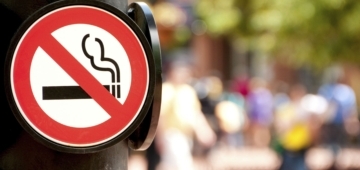This report was published in 2015. Please be aware that more current information may exist and that its positions may no longer reflect those of RSPH.
Health on the High Street 2015
Our campaign and policy report, exploring the healthiness of Britain's high streets, and how businesses and local authorities can improve the health of their communities
What we're calling for
Our research explores how businesses on the high street can impact the health of the public and includes league tables ranking the 'unhealthiest' high streets across London and the UK.
The report also includes a range of measures to make high streets more health promoting, including:
- Local authorities to be given greater planning powers to prevent the proliferation of betting shops, payday lenders and fast food outlets
- Public health criteria to be a condition of licensing for all types of business
- Mandatory food hygiene ratings linked to calorie and nutrition labelling for fast food outlets
- A limit of 5% of each type of business on a high street in order to avoid oversaturation and provide affordable choice
- Legislation to enable local councils to set their own differential business rates to encourage healthier outlets and discourage those that are detrimental to health.
Help us legislate for healthier high streets
55% of the public
thought libraries supported healthy choices
Pubs and bars have a positive effect on health and wellbeing according to
one third
of the public
69% of people
believe fast food takeaways discourage healthy choices
Key facts
Click on the businesses below to explore their contribution to health on the high street

Payday lenders
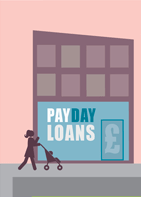
Key facts:
- Over 2,000 of them located across the UK
- Over 60% of people taking out payday loans are classed as ‘vulnerable’
- 1 in 4 who had taken out a payday loan prioritised debt repayments over paying for food
- Proliferation of high street payday loan shops is a result of the withdrawal of ‘mainstream’, high-street-based financial service structure (Fuller et al, 2008) and the introduction of flexible changes to premises function.
Calling for:
- Planning and licensing controls to be put in place to prevent the proliferation of payday lenders
- Payday loan shops to carry a health warning
- Payday loan shop employees to receive training in identifying and sensitively signposting customers who may be at risk of physical and mental health problems.
Bookmakers

Key facts:
- Approximately 8,700 bookmakers in the UK
- Roughly half of gaming revenue is from Fixed Odds Betting Machines (FOBMs)
- FOBMs allow players to stake up to £100 a time on a game that can be played rapidly and repeatedly, posing a real issue for gambling addiction
- There are estimated to be over 34,000 machines in UK.
Calling for:
- Bookmakers to halve the maximum stake on fixed odds betting terminals (FOBTs) from £100 to £50
- Planning and licensing controls to be put in place to prevent the proliferation of bookmakers
- Introduction of cigarette-style health warnings for bookmakers which do not make efforts to make their offer more health promoting.
Fast food
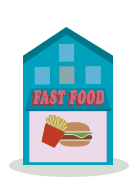
Key facts:
- Over half of British adults have experienced an increase in the number of fast food shops on their nearest high street since they began living there
- Average of around one fast food outlet for every 1,280 people in England, and up to one for every 1,000 Londoners
- Typical fast food meals are energy-dense and served in large portion sizes.
Calling for:
- Planning controls to be put in place to prevent the proliferation of betting shops, payday lenders and fast food outlets
- Fast food outlets encouraged to control portion sizes, adopt healthier cooking methods and improve the health environment they provide
- Government to make calorie and nutritional labelling in fast food outlets mandatory.
The tanning salon
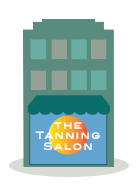
Key facts:
- Estimated 8,000 tanning salons in the UK
- There is clear evidence connecting sunbeds to all three of the main types of skin cancer
- Research that suggests 9 out of 10 of sunbeds emit ultraviolet radiation levels that exceed current safety limits.
Calling for:
- Unmanned tanning salons to be banned in England and the use of safety goggles enforced for all sunbed users
- Encourage tanning salons to switch from sunbeds to offering spray tans
- Introduction of cigarette-style health warnings for businesses which do not make efforts to make their offer more health promoting.
Headshop

Key facts:
- There are estimated to be at least 250 head shops in the UK
- They sell a range of products including new psychoactive substances (NPS) which includes legal highs and paraphernalia associated with drugs
- Presence of head shops on high streets normalises drug use.
Calling for:
- All political parties to commit to ban the import and sale of psychoactive substances
- Between now and a ban coming into place to ensure that products are packaged and branded in a responsible manner
- Increase youth awareness of the risks of NPS through education in schools.
Public house
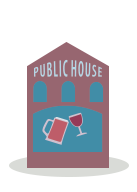
Key facts:
- There are 57,500 pubs in the UK and more than 15 million people visit a pub each week
- Pubs can act as hubs of community life, important for mental health and wellbeing
- They provide a social space and many host a variety of events such as pub quizzes, competitions, sports screenings, live music, parties and have links with local sports teams and charity efforts
- Social isolation is a key trigger for mental health problems which are experienced by 1 in 4 people in the UK each year, and supportive social relationships improve mental health, health behaviour, physical health and reduce mortality risk.
- A Medical Research Council study has noted the positive effects on mental wellbeing of men who felt able to ‘open up’ and talk about their emotions specifically in the pub context.
Library

Key facts:
- Public libraries can have a positive impact on health and wellbeing
- Public libraries drive a range of healthy outcomes in communities, building knowledge, access to information, wellbeing, employment and enterprise
- Libraries contribute significantly to bibliotherapy, defined as the use of books as therapy in mental health treatment, as access to books and reading as a form of self-help leads to substantial long-lasting improvement in people with social anxiety disorder, depression and low self esteem.
Clinic and doctor's surgery
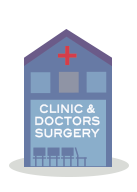
Key facts:
- Healthcare venues are valuable assets on the high street providing medical advice, signposting to a wide range of health services, including smoking cessation and healthy eating, and to mental health services
- The presence of these services on the high street makes them accessible to the wider community and research has found that distance is the strongest barrier to accessing health centres and surgeries, meaning that their presence on the high street positively impacts on the health of that community.
Chemist and Pharmacy

Key facts:
- Of the 11,495 community pharmacies in England, many of them are already delivering a wide range of health improvement programmes
- Estimated that 95% of people visit a pharmacy at least once per year and an estimated 99.8% of people from the most deprived areas live within just a 20 minute walk of a community pharmacy.
Swim and Gym

Key facts:
- Both leisure centres and private health clubs can provide the public with a facility to pursue a range of leisure activities and play an important role in increasing the physical activity levels of local communities by providing a range of exercise options, as well as access to fitness advice from trained professionals
- Research examining the relationship between the distance to a health fitness centre and an adult’s home found that distance to the facility was significantly correlated with uptake and frequency of use
- Leisure centres are often used as a setting for health promotion campaigns, advice and messages, and often host community groups for mothers and toddlers, school children and the elderly.



